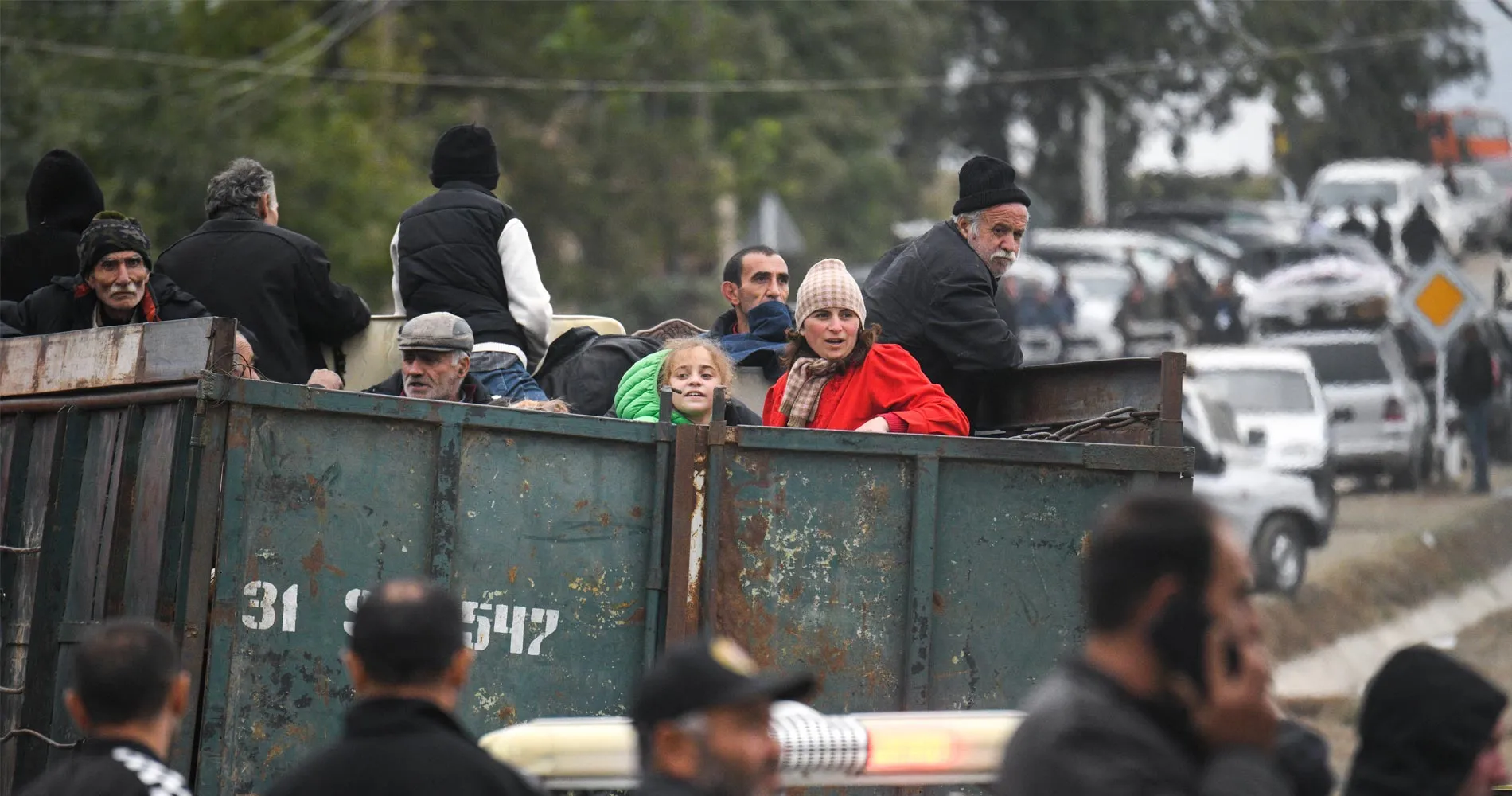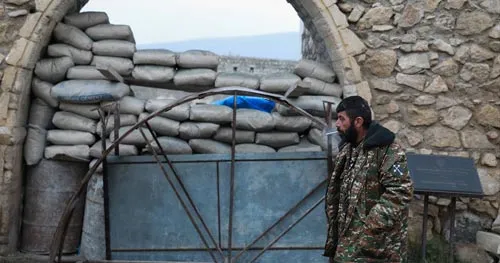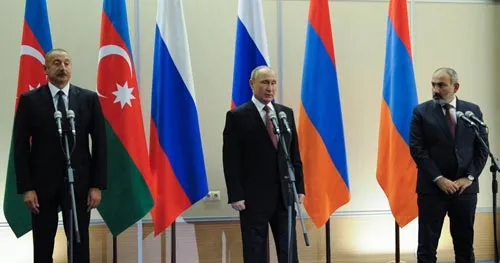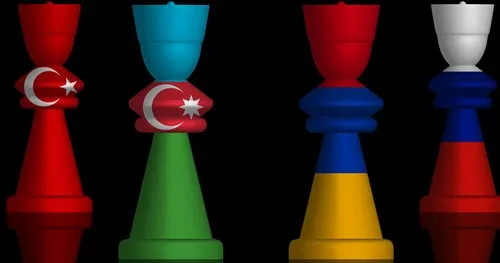The tensions in the mountainous enclave of Nagorno-Karabakh have persisted for decades, with the latest outbreak of violence in 2023 further destabilizing the region forcing over one hundred thousand Armenians from their homes. The International Court of Justice ruled that Azerbaijan must allow ethnic Armenians who fled the region to return to their homes. Will Azerbaijan adhere to this decision?
Murat Gibadyukov, 9 December 2023
Arabic version | German version
Disputes in the mountainous region of Nagorno-Karabakh escalated during the late Soviet era, with both Armenia and Azerbaijan laying claim to it. As the Soviet Union dissolved in 1991, the conflict intensified into full-scale war, resulting in a ceasefire in 1994. This ceasefire left the Nagorno-Karabakh region under the control of the self-proclaimed Republic of Artsakh, functioning as a de facto independent state, although heavily reliant on Armenia and without international recognition, setting the stage for future skirmishes.
The Second Nagorno-Karabakh War
The Second Nagorno-Karabakh War erupted on 27 September 2020, when Azerbaijani forces launched a coordinated offensive, reigniting a long-standing territorial dispute with Armenia over the mountainous region. Unlike previous escalations in the 20th century, the 2020 conflict witnessed the use of advanced military technologies. Drones, long-range artillery, and precision-guided munitions played a prominent role, especially for Azerbaijan. These technologies were reportedly supplied primarily to it by Turkey and Israel, highlighting the broader geopolitical implications of the war. The drones, in particular, gave Azerbaijan a strategic edge, enabling it to carry out precision strikes and advanced surveillance, completely changing the course of the war. Another significant aspect was the involvement of foreign mercenaries. Reports emerged of Syrian fighters being transported to Azerbaijan, allegedly facilitated by Turkey. This internationalization of the conflict added layers of complexity and underscored the broader stakes involved.
After forty-four days of intense combat, the conflict became colloquially known as the “44-Day War.” Azerbaijan recaptured a large territory in Nagorno-Karabakh, an area predominantly Armenian in population and under Armenian control since the 1994 ceasefire. The conflict culminated in Azerbaijani forces taking multiple towns, including the strategically and culturally crucial city of Shusha. The hostilities concluded with a ceasefire agreement signed on November 9, 2020, brokered by Russian President Vladimir Putin, with Azerbaijan’s President Ilham Aliyev, Armenia’s Prime Minister Nikol Pashinyan, and the President of the self-proclaimed Republic of Artsakh, Arayik Harutyunyan, consenting to end the fighting. This agreement resulted in Azerbaijan retaining the areas it had captured during the war and in the deployment of Russian peacekeepers to the region to maintain the ceasefire.
Turkey’s overt support for Azerbaijan, both diplomatically and militarily, played a crucial role in shaping the course of the war. This alignment further isolated Armenia, which, despite its alliance with Russia through the Collective Security Treaty Organization (CSTO), didn’t see direct Russian intervention on its behalf during the active hostilities. Despite brokering the ceasefire and deploying peacekeepers, Russia faced criticism for perceived inaction, especially from the Armenian side. Many Armenians believed that Moscow could have intervened more robustly to prevent or minimize Armenian territorial losses. The lack of Russian support, combined with Azerbaijan’s gains, contributed to an environment of heightened insecurity and distrust among Armenians.
The aftermath of the war was characterized by a mix of nationalist celebration in Azerbaijan and deep introspection and political turmoil in Armenia. The perceived failures of the Armenian leadership during the war led to widespread protests and demands for accountability from the ruling government. On the other hand, Azerbaijan hailed the outcome as a correction of historical injustices and a significant step towards their ultimate objective of exercising sovereignty over Nagorno-Karabakh.
New Escalation in the Region
After three years of relative peace, on 19 September 2023, Azerbaijan launched a surprise large-scale offensive against the self-proclaimed Republic of Artsakh. This action, coming amidst a deepening crisis marked by Azerbaijan’s blockade of Artsakh, was a violation of the 2020 ceasefire agreement. Azerbaijan’s military operation, termed “anti-terrorist activities,” saw great support from Turkey. Turkish President Recep Tayyip Erdogan and Azerbaijani President Ilham Aliyev showcased a united front against Armenia and strengthened their ties during this period.
This offensive led to a massive humanitarian crisis. Over 100 000 ethnic Armenians fled Nagorno-Karabakh by October 2023. The international community reacted with a mix of concern and condemnation. Human rights organizations and genocide prevention experts warned of the risks faced by the Armenian population in Nagorno-Karabakh, with some voices highlighting the potential for another Armenian genocide.
While the international community expressed concern over the situation, this has not translated into real help for the Republic of Artsakh. Tens of thousands of displaced individuals streamed into Armenia, facing dire conditions with insufficient support to meet their immediate needs. On September 28, the Republic of Artsakh was officially dissolved when its President, Samvel Shahramanyan, signed a decree stating that the Republic would officially cease to exist as of 1 January 2024.
The resurgence of violence in Nagorno-Karabakh in 2023 has led to a significant humanitarian crisis, with the large-scale displacement of ethnic Armenians. On 5 October 2023, the European Parliament declared the forced exodus of Armenians from Nagorno-Karabakh as “ethnic cleansing.”
ICJ Decision on Right of Return of Armenians a Precedent for Palestinians in Gaza?
On 17 November 2023 the International Court of Justice (ICJ), by a 13-2 majority, ruled that Azerbaijan must allow all the Armenians who fled Nagorno-Karabakh during the Azerbaijan military takeover in September 2023 to return home. Moreover, the court held that Armenians who remained in Azerbaijan must be kept safe. Judge Joan Donoghue reaffirmed that “Azerbaijan must … ensure that persons who have left Nagorno-Karabakh after 19 September 2023, and who wish to return to Nagorno-Karabakh are able to do so in a safe, unimpeded and expeditious manner.” The court’s orders are legally binding and final.
The order handed down by the UN court is a preliminary ruling in a case brought by Armenia against Azerbaijan accusing it of breaching an international convention against racial discrimination in Nagorno-Karabakh. In turn Azerbaijan brought a case against Armenia at the ICJ alleging breaches of the same convention. Both cases are likely to take years for final adjudication.
In response to the ruling Azerbaijan ’s foreign ministry reiterated its official stance that Azerbaijan did not force out any ethnic Armenians.
The dissolution of the Republic of Artsakh has created new challenges in providing for the basic needs of over 100 000 displaced individuals seeking refuge within its borders. Despite clear violations of sovereignty and the ceasefire agreement, Armenia has found itself largely navigating the aftermath without substantial international support. Calls for peace and offers of mediation have not been matched by the necessary efforts required to help the Republic of Artsakh in its last war.
This decision by the ICJ could constitute an important precedent when deciding future and pending cases of “ethnic cleansing”, like in the case of the ongoing Israeli-Palestinian conflict, where questions of legal status, territorial claims, and the protection of human rights remain deeply contentious and unresolved in the international arena.










